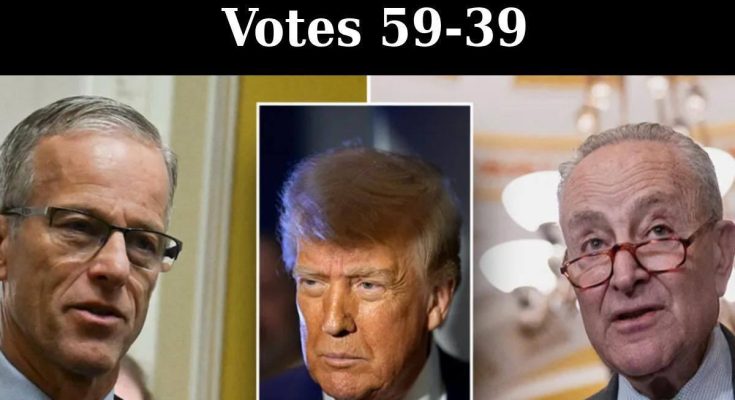Senate Approves Billionaire Ambassadors for Key Allies as Trump’s Approval Ratings Increase
In a notable development for President Donald Trump’s diplomatic strategy, the Republican-majority Senate ratified three prominent ambassadorial appointments on Tuesday, thereby filling essential diplomatic roles in the United Kingdom, Turkey, and Italy.
These confirmations place three billionaire entrepreneurs—who are significant donors and allies of Trump—in vital diplomatic positions that represent American interests with key NATO allies and strategic partners. This Senate action coincides with new polling indicating a marked increase in the president’s approval ratings, despite ongoing controversies related to his assertive trade policies.
Senator Tom Cotton of Arkansas passionately advocated for his fellow Arkansan during the floor debate, characterizing Stephens as a ‘family man, businessman, philanthropist, and patriot’ who is ‘the ideal individual to guide our robust and unique relationship with the United Kingdom.’
Stephens’ confirmation arrives at a pivotal time for U.S.-UK relations. The United Kingdom is currently managing its post-Brexit relationship with the European Union while also aiming to enhance trade and security partnerships with the United States.
The new ambassador will take office as the UK gears up for its forthcoming general election, which polls indicate may result in a governmental shift. Notably, records from the Federal Election Commission illustrate Stephens’ complex political trajectory concerning Trump. During the 2016 presidential campaign, he contributed $1 million to ‘Our Principles PAC,’ an entity specifically established to counter Trump’s candidacy.
However, his stance shifted during Trump’s initial term, leading Stephens to become a prominent financial backer. In 2024, he donated $3 million to MAGA Inc., the principal Super PAC backing Trump’s successful bid for the presidency. When announcing the nomination in December, Trump emphasized Stephens’ long-standing desire for public service, remarking: ‘Warren has always aspired to serve the United States full time.
I am delighted that he will now have that chance as the chief diplomat, representing the U.S.A. to one of America’s most valued and esteemed allies.’
Tom Barrack, a private equity executive, received confirmation as the Ambassador to Turkey with a more favorable vote of 60-36. A long-time ally of President Trump since the 1980s, Barrack possesses significant international business expertise essential for navigating the intricate regional dynamics of this diplomatic role.
His extensive experience includes founding the private equity firm Colony Capital and previously serving in the Reagan administration. Over the decades, he has maintained a close relationship with Trump, advising on the 2016 campaign and leading the 2017 inauguration committee.
Trump praised Barrack’s nomination on Truth Social in December, highlighting his three decades of successful management in global private equity and his respected voice among political and business leaders. Despite facing legal challenges, including charges in July 2021 for allegedly acting as an unregistered foreign agent for the UAE, Barrack denied the accusations and was acquitted in November 2022 after a prominent trial.
His new role in Turkey poses significant diplomatic challenges, as the country, a NATO ally, has complex relations with both the United States and Russia under President Erdoğan, marked by tensions over Turkey’s acquisition of Russian weaponry, policy disagreements regarding Syria and Kurdish forces, and concerns about democratic regression in Turkey.
Tilman Fertitta, a billionaire from Houston, garnered significant bipartisan backing during Tuesday’s confirmations, as the Senate overwhelmingly approved his appointment as Ambassador to Italy with a vote of 83-14. As the CEO of Landry’s, a hospitality corporation, and owner of the NBA’s Houston Rockets, Fertitta brings a wealth of experience in the hospitality and entertainment sectors to his new diplomatic position.
President Trump remarked in December, ‘Tilman is a distinguished entrepreneur who has established one of our nation’s leading entertainment and real estate firms, providing jobs for around 50,000 Americans.’ Fertitta’s Landry’s operates a variety of restaurants, hotels, casinos, and entertainment venues throughout the United States, including popular chains like Morton’s The Steakhouse, Rainforest Cafe, and Bubba Gump Shrimp Co., as well as the Golden Nugget casinos.
The newly appointed ambassador will advocate for American interests in Italy during a time of economic and political difficulties for the country. Italy is currently managing intricate relationships within the European Union while confronting substantial public debt, immigration challenges, and political instability. As the third-largest economy in the eurozone and a member of the G7, Italy is an essential economic and security ally for the United States.
The appointment of these three billionaires to esteemed ambassadorial roles perpetuates a longstanding American practice of rewarding major political contributors with diplomatic positions, a strategy utilized by presidents from both political parties.
Critics contend that this approach favors financial resources and political affiliations over genuine diplomatic expertise, whereas proponents argue that accomplished business figures offer essential real-world negotiation abilities and management experience in diplomatic functions. All three newly appointed ambassadors have shown considerable financial backing for Trump and Republican initiatives.
In addition to Stephens’ $3 million donation to MAGA Inc. during the 2024 election cycle, Barrack and Fertitta have also been prominent contributors to Republican campaigns and political action committees. Fertitta’s political donations have encompassed significant contributions to Republican candidates over various election cycles, although he has occasionally lent support to Democrats as well.
Barrack’s financial backing for Trump traces back to the 2016 campaign, during which he played a key role in raising substantial funds for Trump’s initial presidential campaign. The trend of assigning affluent donors to ambassadorial roles illustrates what some analysts refer to as a “pay-to-play” system in American diplomacy.
While many diplomatic positions, especially in complex or perilous areas, are typically occupied by career Foreign Service officers, prestigious roles in Western Europe and other stable, developed countries have historically been allocated to political appointees with strong connections to the president.
As the newly appointed ambassadors prepare to take on their roles, they will become part of a diplomatic corps that is navigating a swiftly evolving global environment. The foreign policy approach of the Trump administration, characterized by an ‘America First’ philosophy that prioritizes bilateral relations, trade reciprocity, and shared military responsibilities, marks a notable shift from the conventional American diplomacy established in the post-Cold War era.
The ambassadors must effectively convey this vision to their host nations while fostering constructive bilateral ties. Their backgrounds in business may be advantageous in grasping economic interdependence and negotiating trade agreements; however, the scope of their diplomatic duties extends far beyond commercial interests to include security collaboration, cultural exchanges, consular services, and crisis management.
For Stephens, Barrack, and Fertitta, the shift from corporate leadership to diplomatic service will challenge their capacity to apply their business expertise to the distinct demands of international diplomacy. The outcomes of their endeavors will significantly impact not only America’s relations with vital allies but also the ongoing discourse regarding the appropriate qualifications for diplomatic roles within the American framework.
As the administration nears its 100-day milestone, these confirmations signify crucial advancements in forming Trump’s foreign policy team and executing his diplomatic agenda. The ultimate effect of this vision on America’s global standing, or the potential challenges it may introduce in these essential bilateral relationships, remains uncertain; however, the Senate’s votes on Tuesday guarantee that these three affluent businessmen will be pivotal figures in this evolving narrative.




